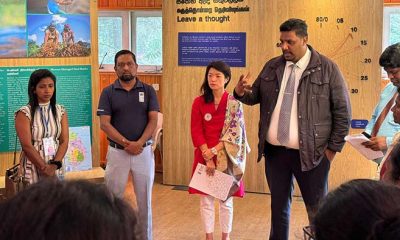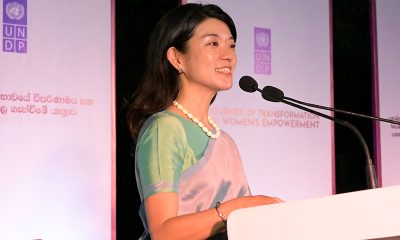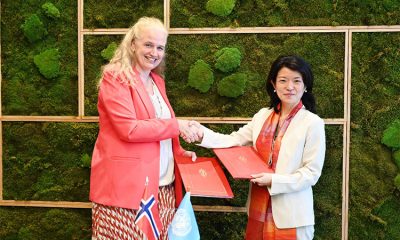News
National Symposium on Local Governance to create more inclusive, responsive and resilient communities
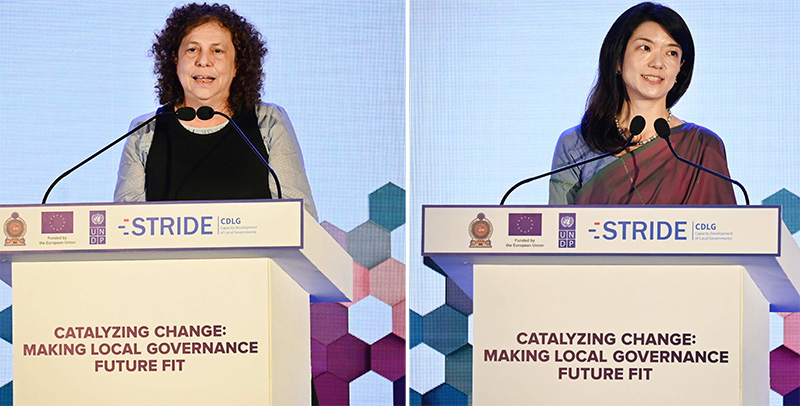
Recognizing the important role government systems play in contributing to building inclusive, responsive and resilient communities, the National Symposium on ‘Catalysing Change: Making Local Governance Future Fit’ was co-convened by the Ministry of Public Administration, Home Affairs, Provincial Councils and Local Government, the European Union Delegation in Sri Lanka and the United Nations Development Programme (UNDP) in Sri Lanka.
A release by the UNDP yesterday said that the dialogue created a platform to foster productive exchanges of insights and best practices among stakeholders concerning local governance, drawing extensively from the lessons and experiences gained over five years, working alongside 134 local authorities in four Provinces in the country through the Capacity Development of Local Government (CDLG) Project, funded by the European Union.
Commenting on the success of the CDLG project, Pradeep Yasarathna, Secretary, Ministry of Public Administration, Home Affairs, Provincial Councils and Local Government noted, “CDLG has leveraged existing frameworks to support local government authorities in delivering more inclusive, accountable, and effective services. This initiative has particularly emphasised gender-responsive budgeting, integrated planning, and robust social, environmental, and gender impact assessments at the grassroots level.”
The closing ceremony for the dialogue took place this morning with the participation of Carmen Moreno, EU Ambassador to Sri Lanka and the Maldives; Azusa Kubota, Resident Representative, UNDP in Sri Lanka; and Pradeep Yasarathna, Secretary, Ministry of Public Administration, Home Affairs, Provincial Councils and Local Government.
Speaking about their role in supporting better service delivery that promotes sustainable development, Carmen Moreno, EU Ambassador to Sri Lanka noted, “The purpose of a democratic system is to provide for the voices of all citizens to be heard and to influence decisions. This is what matters the most, and local governments offer this unique opportunity better than any other level of governance. When local communities are empowered to participate meaningfully in decision making the State becomes responsive to their needs, providing the services and the public goods that are mostly needed, strengthening in this way the social contract with its citizens.”
The national symposium aimed to identify opportunities for scaling best practices, reflect on governance challenges and solutions and promote multi-stakeholder collaboration. Topics such as Accountable, Anticipatory, Agile and Adaptive Governance (AAAG), application of Artificial Intelligence and digital transformation, data and planning for inclusive governance, renewable energy & sustainable waste management, tax and revenue management, and societal change through empowered communities were explored during the 2-day event which brought together over 100 policymakers, Government officials, representatives from the diplomatic corps, the donor community, civil society, and development practitioners.
Speaking on the significance of the symposium and the project, Azusa Kubota, Resident Representative, UNDP in Sri Lanka highlighted, “As CDLG comes to a close in October this year, the symposium has been a pivotal platform, exploring how these values have augmented revenue generation, social accountability, digitalisation, and the green transition, all through the lens of CDLG’s development of local governance. The symposium facilitated sharing of innovative practices to propel scaling up horizontally across the country, going beyond the project’s 4 provinces, and also vertically at the national level.”
By leveraging the experience of experts, practitioners, and multiple stakeholders, the National Symposium will play a pivotal role in shaping the future trajectory of governance in Sri Lanka, ensuring it remains adaptive, resilient, and well-positioned to meet the challenges of tomorrow’s development landscape.
News
USD 900,000 paid monthly for three unused SriLankan aircraft– Dy. Finance Minister
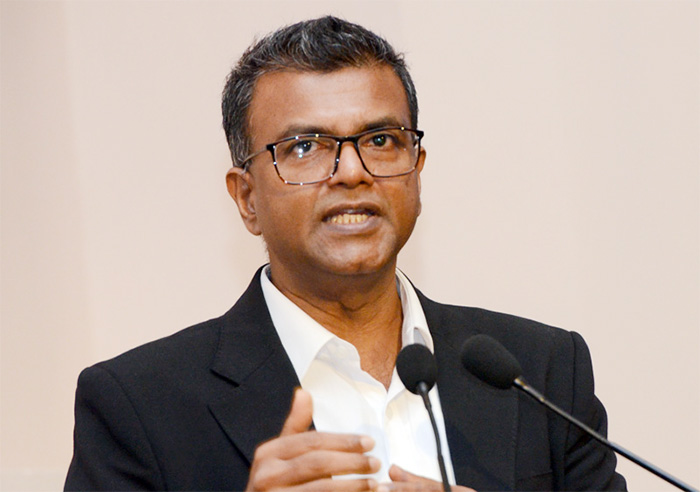
By Saman Indrajith
Finance and Planning Deputy Minister Dr. Harshana Suriyapperuma told Parliament yesterday (25) that SriLankan Airlines was in debt due to political interference under previous governments.
Answering a question raised by Anuradhapura District SJB MP Rohana Bandara, Dr. Suriyapperuma said that such interference had resulted in an ongoing case in international courts.
Dr. Suriyapperuma stated that SriLankan Airlines had earned notoriety for corruption not only here but also abroad.
“Currently, there is an ongoing case in an international court over claims that commissions were sought in respect of the purchase of aircraft. Aircraft have been leased at exorbitant rates, far beyond prevailing market rates,” he said, adding that the actions and decisions of past regimes over the last few decades regarding SriLankan Airlines must be taken into account when examining its debt.
Outlining the measures taken by the government to tackle the staggering debt, the Deputy Minister of Finance said that a five-year programme would be implemented from 2025 to 2030.
Dr. Suriyapperuma explained that despite the allocation of Rs. 20 billion from the 2025 Budget for SriLankan Airlines, the funds would not be utilised for the airline’s operational expenses. Instead, the management had been tasked with transforming it into a self-sustaining entity. Discussions had already begun with relevant stakeholders to restructure the debt, which includes loans obtained in US dollars.
Dr. Suriyapperuma revealed that SriLankan Airlines had been paying USD 900,000 per month in installments for three aircraft that had remained unused for several years. He added that the national carrier currently owned a total of 22 aircraft and employed 3,194 staff members in its main airline operations, along with 2,862 employees in its strategic business units.
Dr. Suriyapperuma also highlighted that the Ministry was currently evaluating those plans, with the expectation of achieving operational profitability and securing government support within the five-year period.
Suriyapperuma assured that measures would be taken to address SriLankan Airlines’ debt without burdening the public.
News
NPP govt. continues ban on Tamil organisations
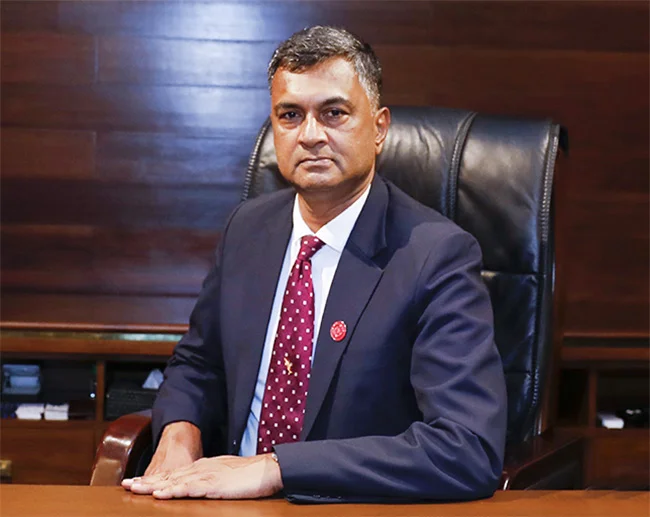
… Easter Sunday carnage suspects among them
The government has issued a gazette extending the ban on several Tamil diaspora groups, alleging they supported “terrorism-related activities,” The Tamil Guardian has reported.
The gazette, signed by Defence Secretary Air Vice Marshal (retd.) Sampath Thuyyakontha, declared that these organisations have “repeatedly provided financial support for terrorism.” As a result, their financial and economic assets remain frozen, and Sri Lankans are prohibited from having any contact with them. Those that do risk being arrested.
The list also reaffirms the ban on 222 individuals allegedly linked to terrorism.
The organisations blacklisted by the Sri Lankan government include:
* Liberation Tigers of Tamil Eelam (LTTE)
* Tamil Rehabilitation Organisation (TRO)
* Tamil Coordinating Committee (TCC)
* World Tamil Movement (WTM)
* Transnational Government of Tamil Eelam (TGTE)
* World Tamil Relief Fund (WTRF)
* National Council of Canadian Tamils (NCCT)
* Tamil Youth Organisation (TYO)
Other organisations listed include several linked to Islamic groups, such as the National Towhead Jema’ah (NTJ) and the Sri Lanka Islamic Student Movement (SLISM).
The Tamil Guardian reported that successive Sri Lankan governments have used terrorism laws to ban Tamil organisations that continue to function openly and legally in the United States, United Kingdom, Canada, and throughout Europe. This ban, however, stifles links between these diaspora organisations and Tamils, making it a criminal offence for Sri Lankan citizens to maintain contact with them.
The reposition of the ban follows a pattern seen in previous years. In 2024, Sri Lanka renewed its prohibition of Tamil diaspora organisations, days after India extended its own ban on the LTTE. The move was widely condemned as politically motivated and an attempt to justify Sri Lanka’s military presence in the “Tamil homeland”.
News
Over 2,000 families face drinking water shortages due to drought in two districts
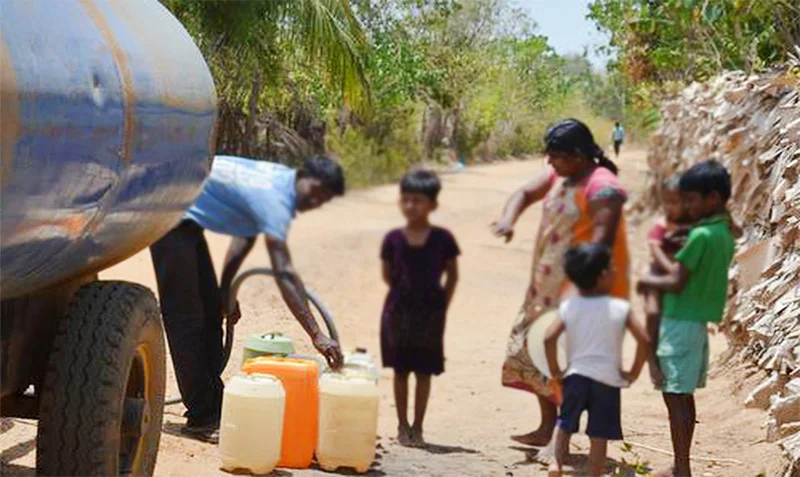
The Disaster Management Centre (DMC) on Tuesday said that 7,258 persons from 2,295 families, in the Ratnapura and Kalutara districts,were facing drinking water shortages due to the prevailing dry weather.
Ratnapura had also experienced the highest temperature in the country in the 24 hours that ended at 9 am on Tuesday, the Met Department said.
Director General of the DMC, Major General (retd.) Udaya Herath said that they were providing drinking water to the affected families using trucks carrying water.
The DMC said that dry weather was prevailing across the country and the public had to remain hydrated.
However, despite the dry weather, tanks used for irrigation had adequate water until May 2025, the Irrigation Department said.
Deputy Director – Weather Forecasting and Early Warning, M.M.P Mendis, told the media on Tuesday that Sri Lanka received very little rain in the months of February and March. However, the Department expected rains to commence from yesterday in some parts of the country.
-

 Business2 days ago
Business2 days agoSri Lanka’s 1st Culinary Studio opened by The Hungryislander
-
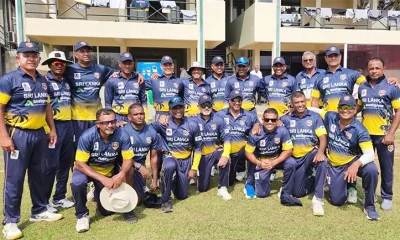
 Sports6 days ago
Sports6 days agoSri Lanka face Australia in Masters World Cup semi-final today
-

 Sports3 days ago
Sports3 days agoHow Sri Lanka fumbled their Champions Trophy spot
-

 News6 days ago
News6 days agoCourtroom shooting: Police admit serious security lapses
-

 News6 days ago
News6 days agoUnderworld figure ‘Middeniye Kajja’ and daughter shot dead in contract killing
-
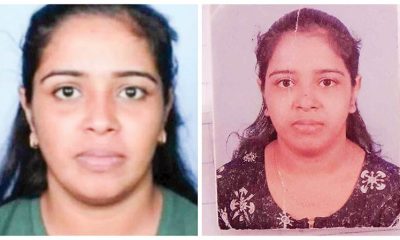
 News5 days ago
News5 days agoKiller made three overseas calls while fleeing
-

 Features3 days ago
Features3 days agoThe Murder of a Journalist
-

 News4 days ago
News4 days agoSC notices Power Minister and several others over FR petition alleging govt. set to incur loss exceeding Rs 3bn due to irregular tender


